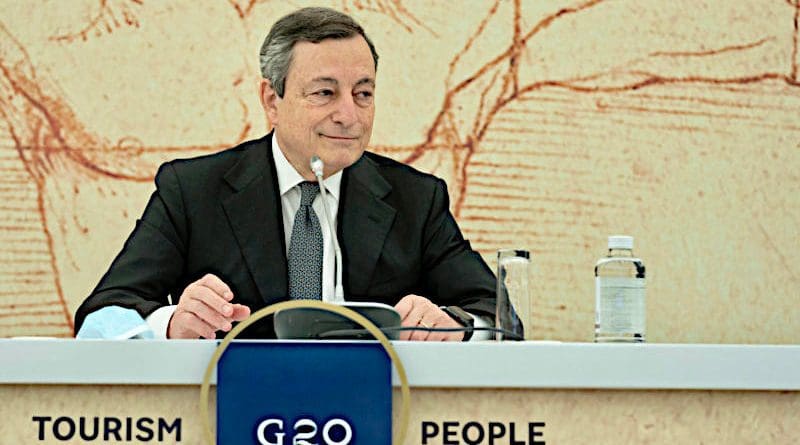The G20 Moves Forward Cautiously Under Italy’s Mario Draghi – Analysis
By David Vines*
In June 2021, leaders from the G7 countries signed off on some impressive-sounding pledges, led by Boris Johnson and the United Kingdom. G20 leaders will do something similar in Rome in a few days, led by Mario Draghi. Italy, once the failed state of the EU, has become a model of good governance.
Although this will be a G20 summit, the agreements that are expected will mainly benefit the rich countries of the G7. Three things appear likely to be missing, all of which are important for emerging market economies and for the world’s poorest countries.
First, the world needs a COVID-19 vaccine and trade agreement. As of early October, 6.5 billion COVID-19 vaccines have been administered globally. The United States and the EU account for nearly 1 billion, India nearly another billion and China more than 2.2 billion of these. At the other extreme, in Africa only about 4 per cent of the adult population has been fully vaccinated. Globally, low-income countries are estimated to have vaccinated less than 3 per cent of their populations.
With the global population above 7 billion and the prospect of third doses in many countries, the world needs about 23 billion doses, compared with the 6.5 billion so far administered. It is essential that global trade is kept open for vaccine supply chains and that vaccine exports are not restricted by the few countries producing vaccines. Investment in production facilities needs to be both subsidised, and globally coordinated, to enable a radical increase in supply.
The WTO’s 12th ministerial conference in November will aim for progress on these issues. The G20 needs to stand squarely behind that initiative. In particular, the world needs new health-sector institutions. The world needs a revamped WHO, a body with delivery capabilities including crisis management skills, money to spend where necessary and the ability to train and support national officials. It also needs a Global Health Board which can monitor the global health system and make recommendations about its ongoing reform.
Second, the G20 should enable developing countries to increase fiscal support for those whose livelihoods have been ruined by the pandemic, as has happened in the world’s richest countries. The G20 should also provide fiscal resources to support health spending in developing countries. Such international cooperation will likely require further financial support from the International Monetary Fund (IMF). Otherwise, international financial markets are likely to panic at the large budget deficits and current account deficits which will emerge. That would create fiscal and currency crises and bring an end to the policies of fiscal support and increased health spending.
Large IMF programs therefore seem inevitable for a number of countries. Global liquidity management will be necessary through coordinated swaps between central banks. Debt relief by the G20 for poor countries and emerging market economies will become essential. A modest step forward has been taken through the issue of US$456 billion of Special Drawing Rights (SDRs) to member countries of the IMF, creating additional international reserve assets. A further step would be for G7 countries to hand over their new SDRs to the world’s poorest countries.
Third, the world needs a global trade agreement to take forward the WTO negotiations that began twenty years ago in Doha. Experience since World War II has shown that countries grow most rapidly when open to international trade, by encouraging domestic firms to expand by exporting into foreign markets and importing whatever goods necessary. But the rise of China has made an open, liberal and cooperative world more difficult to sustain.
Protectionism is on the rise again and there has been a retreat from policies of openness, even in the emerging-market world. It has become more challenging for countries to open when new issues requiring attention are in the services sector, where policy requirements are much more complicated than simply a reduction in tariffs. Regulatory standards in services are difficult to negotiate internationally. Many service-sector producers are monopolistic — whether in finance, accountancy, education or heath — and frequently receive government-funded support. This can make competition unfair.
The challenges are most severe in high-tech digital sectors. In these industries, economies of scale and first-mover advantages in standard-setting create formidable barriers to fair competition. As a result, a battle over the development of digital technology is becoming a central feature of the emerging struggle between the United States and China. But the threats to openness must be addressed. A first step would be for the United States to stop blocking the appointment of new judges on WTO panels so that the WTO’s dispute-settlement process can work properly again.
However, China is afraid of cooperating with a United States that could produce Donald Trump as leader. And the United States is afraid of cooperating with China because that might erode the case for US exceptionalism. These concerns are blocking moves on all three of the issues discussed above.
China fears any agreement about COVID-19 for fear of what the resulting surveillance might expose. Both countries fear a strengthening of the IMF, China for governance reasons and the United States because it fears the loss of its veto over decision-making. The United States also fears any reinvigoration of the WTO, concerned about the restraint which that would impose on the arbitrary restrictions to international trade which Trump introduced and Biden has not removed.
This is the world which Draghi and Italy faced when they took over the management of the G20. We should be understanding of the reasons why they have not been able to achieve more, but seek to build on their ambition.
*About the author: David Vines is Emeritus Professor of Economics and Emeritus Fellow of Balliol College at Oxford University.
Source: This article was published by East Asia Forum

